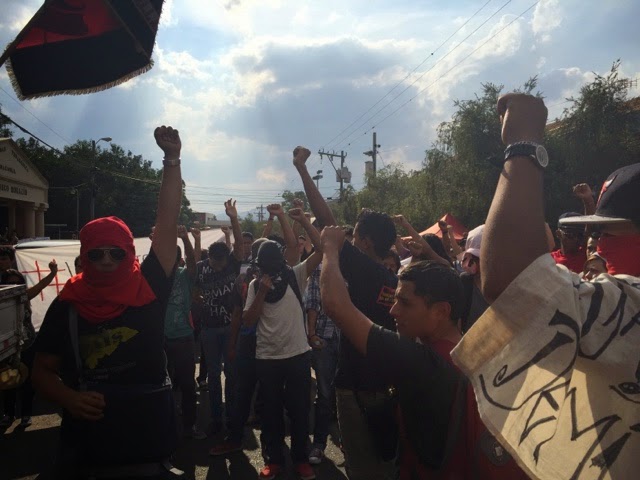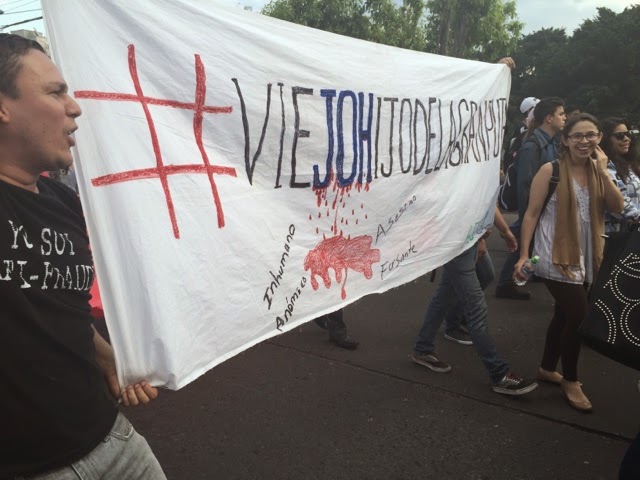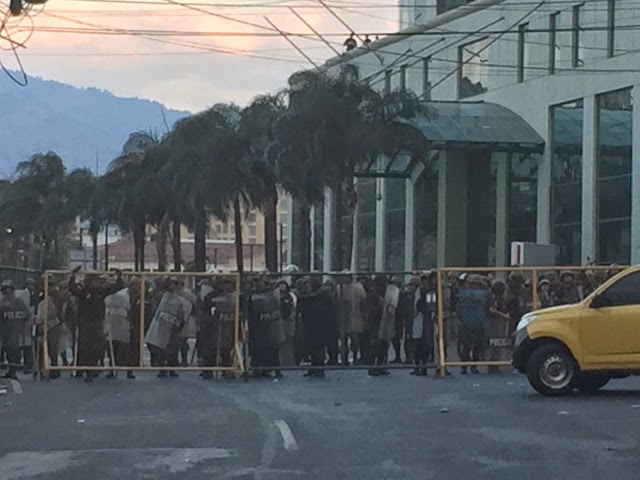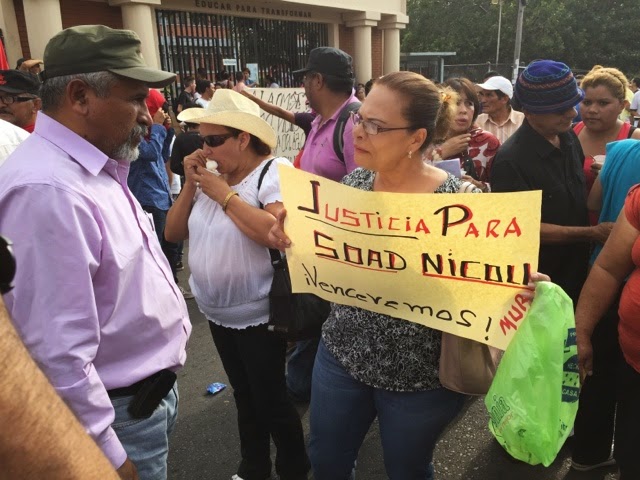USAID Funding Education in Honduras, Criminalization of Student Protests & International Solidarity
/
Photo caption: A poster carried in the marches and circulating around social media. The picture of Soad Nicole Ham Bustillo, the 14-year old high school student killed shortly after her face was splashed across various Honduran media outlets demanding to either Honduran President Juan Orlando Hernandez or Education Minister, Marlon Escoto that: "fuck, hey, fuck, we don’t even have chairs, man, buy chairs, you old son of a bitch”
Update #1 April 16, 2015: How USAID is part of the Privatization of Education in Honduras
According to this article: "At the summit [Seventh Summit of the Americas in Panama City], the U.S. Agency for International Development (USAID) announced it will invest $35 million “in a new higher education program designed to strengthen the capacity of technical training institutions in the region to provide market-relevant training for disadvantaged populations in Central America and the Caribbean.” The April 10 announcement is part of the Obama administration’s overall effort to improve higher education and technical training across these regions.
This announcement seems harmless, in fact, quite good for those thinking that the US could not possibly be promoting their neoliberal and imperialist agenda by financing education. However, in Honduras, USAID has played a very controversial and undermining role in public education and pushed for reforms that public school students are in the streets protesting.
This investment in education is announced as Honduran university and high school students protest school closures, alterations of class hours, insecurity in the country, and underfunded public education. High school students are maintaining their protests and being gassed and repressed by the Honduran police. One director of a high school where students have maintained protests, was suspended for one-year for not handing over the names of the student leaders that were leading or involved in the resistance.
Early this week, the Minister of Education, Marlon Escoto publicly stated that over 30,000 gang members are studying in the public education, and the protests are being led by the mareros (gangs). This is an attempt to once again criminalize the student population by 'blaming it on the gangs' similar to the discourse used to cover up the death-squad style killings of the four high school students at the end of March. Many Honduran groups and pro-resistance media are saying the government is repeating the false positive strategy employed under Plan Columbia by accusing the four assassinated students involved in the protests, of being mareros.
USAID role is fundamental to the on-going neoliberal changes in public education. For years, USAID has financed former President Ricardo Maduro's foundation, FEREMA, that helps coordinate "community-managed schools" called PROHECO schools in rural areas offering kindergarten and elementary school education to 6th grade. PROHECO schools are the alternatives to the government investing in building rural public schools or offered in areas where public education isn't available. Teachers associations describe the PROHECO schools as nothing short of a privatized parallel to public schools, which are fundamentally linked to the destruction of the collective bargaining power of teachers' associations and labor exploitation. In PROHECO schools, teachers are paid much less and are not required to have a formal teaching education like all teachers in the public system. Teachers in PROHECO schools are also largely hired based on their loyalty to the political party in power (National party). Political patronage (and some great academic research has shown this) has severely reduced the effectiveness of the schools and the so-called "community participation" in their management, causing conflicts between parents, teachers, and the local municipality. For example, two PROHECO schools have been burnt to the ground in Choloma and San Francisco de Lempira b/c of the conflict between the National party and family members over the way the schools were being managed and teachers being hired.
Photo caption: A banner erected at the entrance of the Vicente Caceres Central Institute, the largest secondary public school and where Soad Nicole Ham studied before she was killed. Banner reads "no to death squads - Soad Nicole lives"
Yesterday, USAID together with the Honduran police handed out 4,000 back packs to an elementary school in an "high-risk" neighbourhood in San Pedro Sula. The recent expansion of the Recreovias program coordinated with local police and military police - funded by USAID and the US Embassy - aims to create safe spaces and anti-gang initiatives in "high risk neighbourhoods" and with programs like Guardianas de la Patria, USAID are funding an indoctrination of youth to "military values" as so called "place-based approaches" in certain high risk neighbourhoods.
So as USAID finances private educational initiatives in rural areas by funding FEREMA, a major advocate for the expansion of private education, the public education is being destroyed by closing schools, limiting public school programs, and forcing students with little or no options to pay expensive rates for inferior private education. USAID also finances the Association for a More Just Society (the Honduran partner for Transparency International) that created Transformemos Honduras, a 'civil society initiative' that is 100% golpista, that in 2011 when the teachers were in the streets protesting the privatization of education, put together a website around the country where parents (or anyone really) could electronically complain about public teachers that were protesting and not showing up for class. The electronic complain system is still active.
Update #2 April 13, 2015: Protest in front of Ministerio Publico in Tegucigalpa & International Solidarity
Student protests in Honduras continue today. At the moment, students from the Honduran Technical Institute in La Kennedy, Tegucigalpa are confronting repression by Honduran police as they occupy their high school. The students are protesting the one-year suspension of the school's director, Nelson Calix for allegedly supporting their struggle and for not handing over the names of student leaders involved in the protests.
The Honduran technical institute is one of the schools that the government is talking about closing, along with other high schools that offer specialized programs.
Last Wednesday, various groups (approximately 300 people) led by COPINH and OFRANEH protested outside of the Ministerio Publico (MP) in Tegucigalpa, demanding justice for the four students that were killed at the end of March. Berta Caceres of COPINH read the HSN's solidarity letter (copied below) to the student movement. At the same time as the gathering in front of the MP, students protesting around the country occupying their schools or taking to the streets.
Photo caption: Protest coordinated by various organizations in Tegucigalpa in front of Ministerio Publico, April 8, 2015.
In efforts to criminalize and intimidate the student movement, five high school students from a normal school in Tegucigalpa were also expelled for their involvement. So far, no one has been held accountable for the deaths of the four students killed at the end of March, however the Honduran media (and the government) has tried very hard to give the impression that investigations were happening, arrests were made, and that the deaths were linked to gangs instead of government-led repression and death squads.
***************************************************************************************************************
April 8, 2015
To: Honduran Public High School and University Students in Resistance,
On behalf of over 30 organizations from the United States and Canada, the Honduras Solidarity Network (HSN) extends its deepest condolences to the family members, peers, and friends of the four students – Soad Nicole Ham Bustillo, Darwin Josué Martínez, Elvin Antonio López, and Diana Yareli Montoya – who were murdered on March 24 and 25, 2015 in Tegucigalpa.
We condemn the death squad-style killings of these four high school students, who had been involved in student protests in the days leading up to their murder. We are also outraged at the repression and terror campaign that the student and social movements face in the country as they organize street protests across the country to oppose neoliberal reforms to public education. These reforms - including closing teaching and technical schools, extending class times, and eliminating night classes, amongst others - are being implemented by the Honduran government with direct financing and support from the Inter-American Development Bank (IDB), the World Bank, the International Monetary Fund (IMF) and the United States government’s Agency for International Development (USAID).
As a network that opposes US imperialism in Honduras, we express our shame in the US government’s unconditional support for the Honduran government and state forces that commit gross human rights violations with complete impunity, against children and youth. We condemn the participation of John Kelly, the Commander of the US Southern Command and Erin Logan, a high-level White House representative in the “Central American Conference on Transnational Security” in Tegucigalpa on March 25 – the same day that news surfaced about the murder of the four high school students. The involvement of the US and Canadian governments in “security” in Honduras and Central America is not producing safer streets or reducing the high levels of violence in the country. Instead the US and Canada trains and funds Honduran security forces to repress protesting students, indigenous and Afro-indigenous populations protecting their natural resources and land, women, the LGBT community, and campesinos, amongst others.
We stand in solidarity with the Honduran student movement, the Plataforma del Movimiento Social y Popular de Honduras (PMSPH), and the Frente Nacional de Resistencia Popular (FNRP) in demanding justice for the four murdered students, and their struggle for free, universal, and accessible public education in Honduras.
Sincerely,
Honduras Solidarity Network (HSN)
Update #1 April 16, 2015: How USAID is part of the Privatization of Education in Honduras
According to this article: "At the summit [Seventh Summit of the Americas in Panama City], the U.S. Agency for International Development (USAID) announced it will invest $35 million “in a new higher education program designed to strengthen the capacity of technical training institutions in the region to provide market-relevant training for disadvantaged populations in Central America and the Caribbean.” The April 10 announcement is part of the Obama administration’s overall effort to improve higher education and technical training across these regions.
This announcement seems harmless, in fact, quite good for those thinking that the US could not possibly be promoting their neoliberal and imperialist agenda by financing education. However, in Honduras, USAID has played a very controversial and undermining role in public education and pushed for reforms that public school students are in the streets protesting.
This investment in education is announced as Honduran university and high school students protest school closures, alterations of class hours, insecurity in the country, and underfunded public education. High school students are maintaining their protests and being gassed and repressed by the Honduran police. One director of a high school where students have maintained protests, was suspended for one-year for not handing over the names of the student leaders that were leading or involved in the resistance.
Early this week, the Minister of Education, Marlon Escoto publicly stated that over 30,000 gang members are studying in the public education, and the protests are being led by the mareros (gangs). This is an attempt to once again criminalize the student population by 'blaming it on the gangs' similar to the discourse used to cover up the death-squad style killings of the four high school students at the end of March. Many Honduran groups and pro-resistance media are saying the government is repeating the false positive strategy employed under Plan Columbia by accusing the four assassinated students involved in the protests, of being mareros.
USAID role is fundamental to the on-going neoliberal changes in public education. For years, USAID has financed former President Ricardo Maduro's foundation, FEREMA, that helps coordinate "community-managed schools" called PROHECO schools in rural areas offering kindergarten and elementary school education to 6th grade. PROHECO schools are the alternatives to the government investing in building rural public schools or offered in areas where public education isn't available. Teachers associations describe the PROHECO schools as nothing short of a privatized parallel to public schools, which are fundamentally linked to the destruction of the collective bargaining power of teachers' associations and labor exploitation. In PROHECO schools, teachers are paid much less and are not required to have a formal teaching education like all teachers in the public system. Teachers in PROHECO schools are also largely hired based on their loyalty to the political party in power (National party). Political patronage (and some great academic research has shown this) has severely reduced the effectiveness of the schools and the so-called "community participation" in their management, causing conflicts between parents, teachers, and the local municipality. For example, two PROHECO schools have been burnt to the ground in Choloma and San Francisco de Lempira b/c of the conflict between the National party and family members over the way the schools were being managed and teachers being hired.
Photo caption: A banner erected at the entrance of the Vicente Caceres Central Institute, the largest secondary public school and where Soad Nicole Ham studied before she was killed. Banner reads "no to death squads - Soad Nicole lives"
Yesterday, USAID together with the Honduran police handed out 4,000 back packs to an elementary school in an "high-risk" neighbourhood in San Pedro Sula. The recent expansion of the Recreovias program coordinated with local police and military police - funded by USAID and the US Embassy - aims to create safe spaces and anti-gang initiatives in "high risk neighbourhoods" and with programs like Guardianas de la Patria, USAID are funding an indoctrination of youth to "military values" as so called "place-based approaches" in certain high risk neighbourhoods.
So as USAID finances private educational initiatives in rural areas by funding FEREMA, a major advocate for the expansion of private education, the public education is being destroyed by closing schools, limiting public school programs, and forcing students with little or no options to pay expensive rates for inferior private education. USAID also finances the Association for a More Just Society (the Honduran partner for Transparency International) that created Transformemos Honduras, a 'civil society initiative' that is 100% golpista, that in 2011 when the teachers were in the streets protesting the privatization of education, put together a website around the country where parents (or anyone really) could electronically complain about public teachers that were protesting and not showing up for class. The electronic complain system is still active.
Update #2 April 13, 2015: Protest in front of Ministerio Publico in Tegucigalpa & International Solidarity
Student protests in Honduras continue today. At the moment, students from the Honduran Technical Institute in La Kennedy, Tegucigalpa are confronting repression by Honduran police as they occupy their high school. The students are protesting the one-year suspension of the school's director, Nelson Calix for allegedly supporting their struggle and for not handing over the names of student leaders involved in the protests.
The Honduran technical institute is one of the schools that the government is talking about closing, along with other high schools that offer specialized programs.
Last Wednesday, various groups (approximately 300 people) led by COPINH and OFRANEH protested outside of the Ministerio Publico (MP) in Tegucigalpa, demanding justice for the four students that were killed at the end of March. Berta Caceres of COPINH read the HSN's solidarity letter (copied below) to the student movement. At the same time as the gathering in front of the MP, students protesting around the country occupying their schools or taking to the streets.
Photo caption: Protest coordinated by various organizations in Tegucigalpa in front of Ministerio Publico, April 8, 2015.
In efforts to criminalize and intimidate the student movement, five high school students from a normal school in Tegucigalpa were also expelled for their involvement. So far, no one has been held accountable for the deaths of the four students killed at the end of March, however the Honduran media (and the government) has tried very hard to give the impression that investigations were happening, arrests were made, and that the deaths were linked to gangs instead of government-led repression and death squads.
***************************************************************************************************************
April 8, 2015
To: Honduran Public High School and University Students in Resistance,
On behalf of over 30 organizations from the United States and Canada, the Honduras Solidarity Network (HSN) extends its deepest condolences to the family members, peers, and friends of the four students – Soad Nicole Ham Bustillo, Darwin Josué Martínez, Elvin Antonio López, and Diana Yareli Montoya – who were murdered on March 24 and 25, 2015 in Tegucigalpa.
We condemn the death squad-style killings of these four high school students, who had been involved in student protests in the days leading up to their murder. We are also outraged at the repression and terror campaign that the student and social movements face in the country as they organize street protests across the country to oppose neoliberal reforms to public education. These reforms - including closing teaching and technical schools, extending class times, and eliminating night classes, amongst others - are being implemented by the Honduran government with direct financing and support from the Inter-American Development Bank (IDB), the World Bank, the International Monetary Fund (IMF) and the United States government’s Agency for International Development (USAID).
As a network that opposes US imperialism in Honduras, we express our shame in the US government’s unconditional support for the Honduran government and state forces that commit gross human rights violations with complete impunity, against children and youth. We condemn the participation of John Kelly, the Commander of the US Southern Command and Erin Logan, a high-level White House representative in the “Central American Conference on Transnational Security” in Tegucigalpa on March 25 – the same day that news surfaced about the murder of the four high school students. The involvement of the US and Canadian governments in “security” in Honduras and Central America is not producing safer streets or reducing the high levels of violence in the country. Instead the US and Canada trains and funds Honduran security forces to repress protesting students, indigenous and Afro-indigenous populations protecting their natural resources and land, women, the LGBT community, and campesinos, amongst others.
We stand in solidarity with the Honduran student movement, the Plataforma del Movimiento Social y Popular de Honduras (PMSPH), and the Frente Nacional de Resistencia Popular (FNRP) in demanding justice for the four murdered students, and their struggle for free, universal, and accessible public education in Honduras.
Sincerely,
Honduras Solidarity Network (HSN)
















